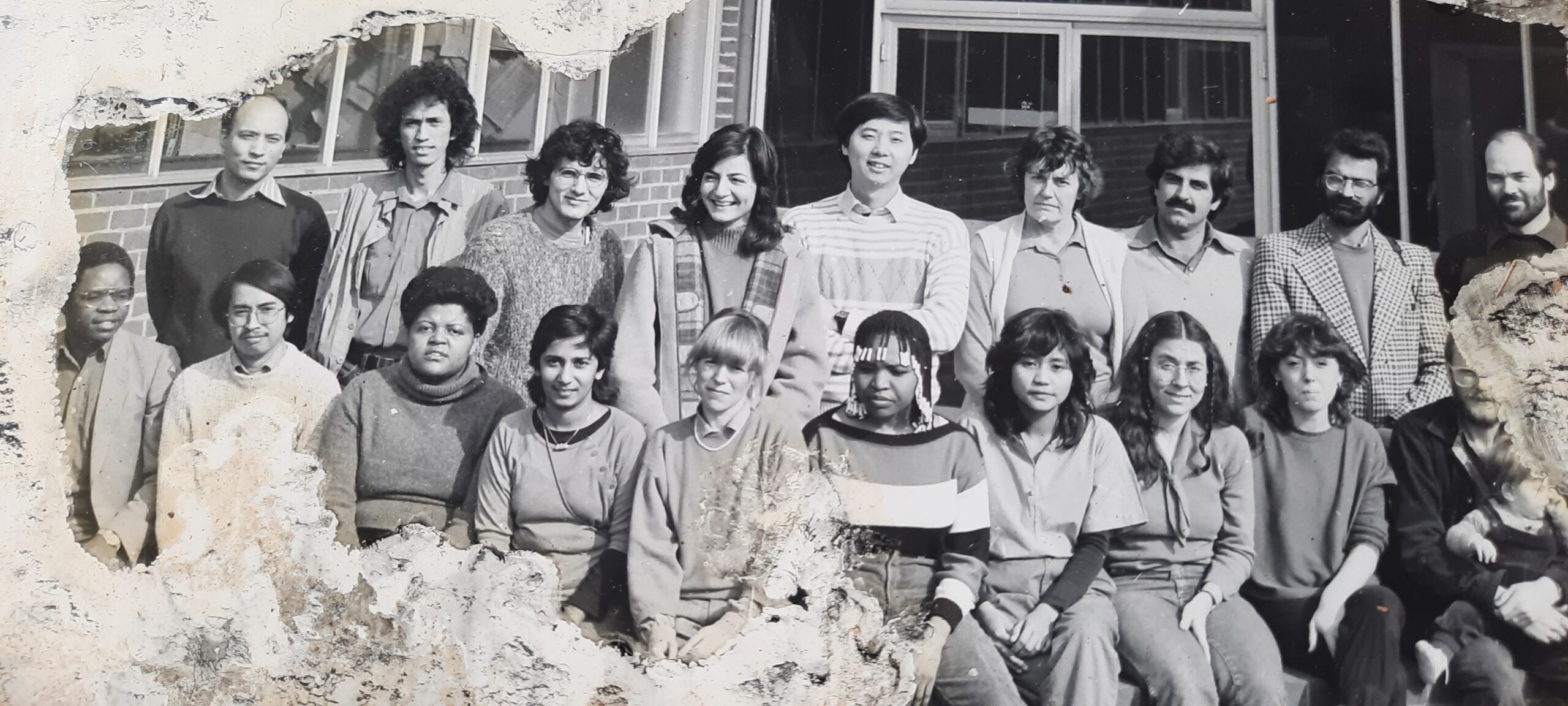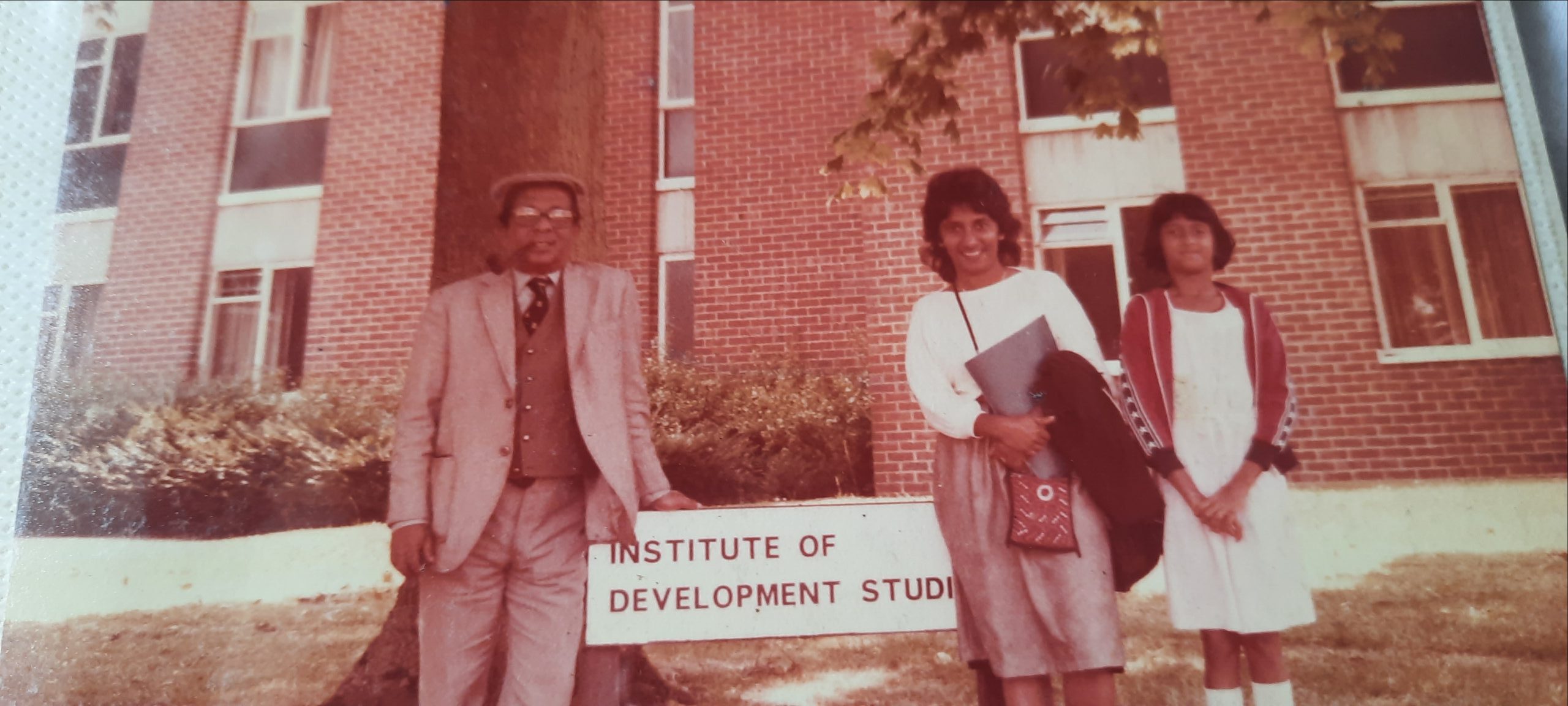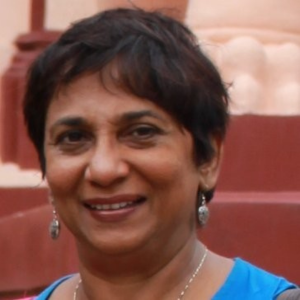Dr Sepali Kottegoda – Director Programmes, Gender and Political Economy at Women and Media Collective, Sri Lanka and IDS alum (MPhil class of 1984 and DPhil class of 1990) – recently came back to IDS to deliver a guest lecture on exploring unpaid care in Sri Lanka. While she was with us, we asked Sepali to share some of her reflections on her time as a student at IDS and how this contributed to her successful career in international development.

Interviewer: What were you doing before you came to IDS?
Sepali: Before I came to study at IDS, I was working as a junior research assistant at the Social Scientists’ Association (SSA) in Sri Lanka. Prior to this, I had completed a BA (Hon) Degree in English Literature at the University of Kelaniya in Sri Lanka. In my first year at university I also followed a course on economics. By the time I graduated, I realised that I needed to change direction from English Literature to the social sciences, as I had become very interested in socio-economic issues in Sri Lanka, which had at that time begun its ‘Open Economy’ approach to development. Hence, I was very happy when I was invited to join the SSA.
Interviewer: Why did you choose to study at IDS?
Sepali: I first became aware of IDS through meeting Dr. Kate Young (Fellow in Gender at IDS at the time) in Colombo in 1981, at a joint conference held by the SSA and IDS on Export Processing Zones (EPZs) or Free Trade Zones (FTZs) in the newly industrialising countries (NICS) in South East Asia. At that time, Sri Lanka had set up its first Free Trade Zone in the outskirts of Colombo.
At the conference, there were many participants from women’s organisations from the Asia Pacific region who were working on the rights of women workers in such enterprises. Diane Elson and Kate Young were the key persons on the IDS team and Kumari Jayawardena and Sunila Abeysekera were the core team from the SSA. At the time, I was working with Sunila, researching the working lives of women employed in the Sri Lankan FTZ. During the conference, Kate had several discussions with me and invited me to apply for the Master of Philosophy (MPhil) in Development Studies at IDS, which I subsequently did.
At that time, tuition fees for overseas students were the same as those for British students. I was awarded a scholarship from the Norwegian government towards the MPhil, which was an additional factor for choosing to study at IDS.

What appealed most to me was the interdisciplinary format of the MPhil. The faculty at IDS comprised persons such as David Evans, who was co-chair with Kate Young on the programme, Carlos Fortin, Charles Harvey, Malcom Segal, Martin Greely, Stephany Griffith-Jones, and Raphie Kaplinsky. In particular, Kate Young was key to developing my academic interest in women and household politics, including household structures and the politics of intra-household co-operations.
I recall seeing Dudley Seers coming into IDS every now and then. In fact, I was receiving the Dudley Seers study support grant while I was on the DPhil programme.
After completing the MPhil, I went on to read for a Doctorate of Philosophy (DPhil) in Development Studies at IDS, which consolidated my interest and research on women’s survival strategies in low-income households. Mick Moore and Ines Smyth were the examiners of my thesis and I very much appreciated the constructive responses they gave.
Interviewer: What are you doing now?
Sepali: In 1984, I co-founded of the Women and Media Collective (WMC), Sri Lanka with Sunila Abeysekara and Kumudini Samuel. WMC networks with women’s organisations across the country and is also invited to contribute to policy making on issues such as women’s representation in politics, women’s employment, women’s overseas employment migration, gender and climate change, and sexual identities. I served as its Executive Director for a number of years. I am now Director Programmes, Gender and Political Economy at WMC. My area includes women’s employment, overseas migration, sexual and reproductive health and rights and, unpaid care work.
The pioneering work that WMC carries out on unpaid care work has brought out the relevance of the issue to grassroots organisations, activists and researchers. We have also been able to bring in policymakers to recognise this issue through initiating policy dialogues. We use international mechanisms, such as the Convention on the Elimination of All Forms of Discrimination against Women (CEDAW), and we refer to the Beijing Platform for Action (BPFA) to further our work from a rights perspective. We also engage with the LGBTIQ community in Sri Lanka, which has been able to better organise and, together with rights groups, work on protecting their rights through decriminalising homosexuality in the country.
To me, it is essential to continue to push for comprehensive understanding of women’s labour, both paid and unpaid. While much of the discourse on unpaid care work is around providing access to childcare, disability care and elder care services that are key to allowing women the space and time to take up paid work (i.e. increase women’s participation in the labour force) we need to also take cognisance of interventions that address gender disparities in responsibilities within households, recognising the importance of women’s life choices, whether it is relating on sexual and reproductive health and rights (SRHR), on taking up paid work, or other issues. The state, along with the private sector, have key roles in providing accessible, good quality care services at nominal cost to households, especially in communities and countries where many women are from low income households.
Interviewer: How did studying at IDS impact on your career path?
Sepali: IDS strengthened my academic discipline and gave me opportunities to also learn through interaction with other students and colleagues on the programme. The interdisciplinary focus was extremely useful for me, given my own academic journey. It made me look closely at Sri Lankan research on women at the time and gave me direction on focusing my MPhil thesis on women in the informal sector in India, specifically on the Self Employed Women’s Association (SEWA), as there was little research in this area in Sri Lanka. It became a stepping stone to my DPhil research later, which adapted an economic anthropological framework.
Looking back, I believe that the learnings from my studies at IDS has enabled me to recognise the need to address the varying degrees of complexity when we are looking at households, women, men in any discussion on macro and micro economic development.
Interviewer: You recently came and gave a guest lecture at IDS. How did it feel to be back at IDS again?
Sepali: Giving a guest lecture at IDS was very satisfying! My academic direction was consolidated during my studies there and I was very pleased to have had the opportunity to share my current research topic with others at IDS. I think this is an excellent way to bring in alumni from across the different programmes that were/are offered at IDS.
Mick Moore took me on a mini tour at IDS and it felt like familiar territory with new spaces that had been set up. It brought back a lot of memories of my time as a student, especially seeing the current students on the MA programmes. The building has changed somewhat – there seem to be more lecture rooms; the IDS library, which used to be downstairs, is now physically connected to what used to be the University’s ‘main’ library; what we called the ‘common room’ with newspapers, coffee machine and pigeon holes for our (snail) mail and, where some of us students used to hang out in between lectures etc., are no longer there. But the atmosphere of learning and interaction between students and faculty are very much there still.
Interviewer: What advice would you give to someone who is considering applying to IDS?
Sepali: I have encouraged students and young colleagues to apply to IDS as it is an institution that would provide them with a sound academic foundation to critically understand the concept and aspects of the application of these frameworks for ‘development’.
On my recent visit to IDS in March this year, I saw young students from many countries who were studying their master’s or PhDs. This, I am happy to note, is a core factor for anyone who is looking to work in one’s country or take other paths for informed and disciplined contributions towards social and economic development.

